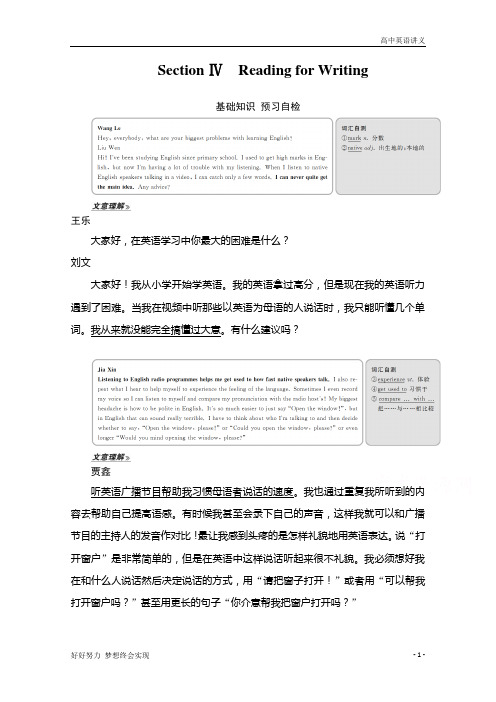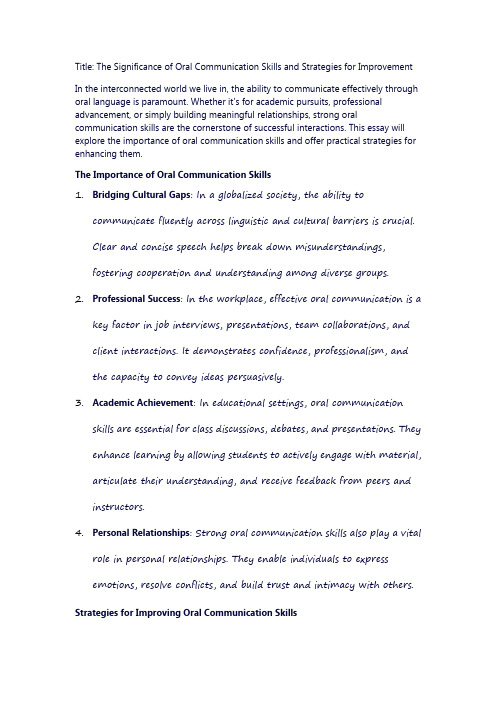(完整word版)英语口语重要性
- 格式:doc
- 大小:25.01 KB
- 文档页数:2

本文部分内容来自网络整理,本司不为其真实性负责,如有异议或侵权请及时联系,本司将立即删除!== 本文为word格式,下载后可方便编辑和修改! ==英语面试交流肢体语言很重要中国学生往往意识不到,在用英语(论坛)进行表达的同时,还伴随着体态语言。
英语中有一句谚语是这样说的:Actions speak louder than words。
这句话的underlying meaning(内在含义)是“事实胜于雄辩”,我们不妨把它理解成Your body movements speak louder than your words。
(你的体态动作比你的语言更有力量。
)你站在那里什么也不用说,但实际上你的体态语言已经说明了一切。
世界上最大的猎头公司 Korn/Ferry International的人力资源专家的统计结论也显示,“In a job interview,you will bevirtually fully judged within the first 30 seconds, even before you start to talk。
”(在工作面试中,你甚至还没有开始讲话,面试官实际上已经在30秒之内对你有了全面的评价。
)这其中:visual (what you see,你所看到的)占55%;audio(what you hear,你所听到的)占38%;content(what is said,你们真正的谈话内容)占7%。
由此可见,体态语言在交流中扮演着重要的角色。
而在体态语言的具体应用上要注意哪些方面呢?第一,在与西方人面对面谈话的时候要注意保持一定的距离(keep acertain distance)。
当然,不同社会文化习俗的人保持的距离是不一样的。
对英美人而言,这个距离是3英尺,如果是面对东欧人和南美人,这个距离还可以再近些,但仍要在2英尺以上。
第二,在跟英美人第一次见面相互握手的时候,一定要有点力度,如果握起手来有气无力,或者只伸出手指尖来给人握,就会给对方冷冰冰的感觉,英文中管这种握手叫做wet handshake。

语言表达能力的重要性英文作文英文回答:Language expression ability is extremely important in both personal and professional life. Being able to effectively communicate in a language allows us to express our thoughts and ideas clearly, and to understand and connect with others. In a professional setting, good language skills are often a requirement for many jobs, and can greatly impact our ability to succeed and advance in our careers. For example, when I was working on a team project, I had to present our findings to the rest of the company. My ability to articulate our research and recommendations in a clear and persuasive manner was crucial in gaining the support of my colleagues and superiors.中文回答:语言表达能力在个人和职业生活中都非常重要。
能够用一种语言有效地沟通,使我们能够清晰地表达自己的想法和观点,理解并与他人建立联系。
在职业环境中,良好的语言能力通常是许多工作的要求,可以极大地影响我们在职业生涯中的成功和晋升。
例如,当我在团队项目中工作时,我不得不向公司的其他成员展示我们的研究成果。

日常英语口语对话日常英语口语汇总- 日常英语口语对话_英语日常对话汇总,最好的、最权威的、最新的日常英语口语对话汇总!日常英语口语对话_英语日常对话、习惯语500句(高级)(之一)1. Hold on 等一下(口语中,人们不太用wait a minute)如果两人辩论,吵架,抬杠,你要别人“打住”,可以说,hold it right there.2. I hate his guts. 我最讨厌他。
也有说I hate him guts. Guts 是肠子,相当于“恨之入骨”的意思。
He doesn’t have much guts. 他是个胆小鬼。
ut feeling 直觉3. Nuts, 果仁,核,为复数时,意为“疯子”,He is nuts。
他有神经病。
He went nuts and killeda guy.他发疯了,结果杀了一个人。
You are driving me nuts. 你真是要把我逼疯。
a tough nut to crack, 一项艰巨的任务,一个难解之题4. How is everything? (还好吗?) I am just stuck in a rut, doing the same things every day. I wish I could do something different. (烦死了,每天都是干同样的活,我真想换个活法。
) rut 日常的,每天都如此,get in a rut,日复一日,天天如此5. I have totally sold out to your idea. 我100%地赞同赞同你的意见。
类似的话还有If you are not careful enough, you will buy into his bad idea. 如果你不小心的话,你就会采纳他的这馊主意。
6. I am just ecstatic about going to visit you soon. 马上要见你,我高兴死了。

word完整版)初中英语新课程标准解读初中英语新课程标准的教材内容更加贴近学生的生活,注重培养学生的实际语言运用能力。
除了传统的语法、词汇等基础知识外,还加入了更多的交际用语和实用话题,如购物、旅游、交通等,以便学生能够更好地运用英语进行日常交流。
同时,教材内容也注重文化的传承和交流,让学生了解英语国家的文化和风俗惯,增强跨文化交际能力。
三)教学模式方面初中英语新课程标准鼓励学生积极参与课堂教学,采用多种教学模式,如小组合作、任务型教学等,让学生在互动中研究,增强学生的自主研究能力和合作精神。
二、初中英语新课标存在的一些弊端虽然初中英语新课程标准在很多方面都有所改进,但也存在一些弊端。
首先,教材设计和编写需要时间,目前市场上的教材选择较少,教师需要花费更多的时间去寻找和筛选适合的教材。
其次,新课程标准的实施需要更多的教师培训和支持,教师需要不断提升自己的专业水平和教学方法,才能更好地实施新课程标准。
三、教师如何顺应初中英语新课标的教学策略教师在实施初中英语新课程标准时,应该注重培养学生的实际语言运用能力和自主研究能力,采用多种教学模式,如小组合作、任务型教学等,让学生在互动中研究,增强学生的合作精神和跨文化交际能力。
同时,教师也需要不断提升自己的专业水平和教学方法,积极参加教师培训和交流活动,以更好地实施新课程标准。
我校现在使用的《仁爱版初中英语》是由多个单位的专家、教授和英语教学一线教师合编的。
而其他地区的初中新课标英语是由XXX与XXX合编的。
新课标的目的是使教材更贴近生活,激发学生的研究兴趣和动力。
但是,对于中国的实际情况,新课标并没有真正考虑到农村学生的情况。
很多农村学生对于国外的食物名称不了解,比如pizza、hot dog和sandwich 等。
这些章节只适合比较发达的城市地区的学生,对于偏小城镇和农村的学生反而不适合。
因此,在相应的课程安排上可以以中国的传统食物来进行说明,这样中国的学生就能更好地接受。

Section ⅣReading for Writing基础知识预习自检王乐大家好,在英语学习中你最大的困难是什么?刘文大家好!我从小学开始学英语。
我的英语拿过高分,但是现在我的英语听力遇到了困难。
当我在视频中听那些以英语为母语的人说话时,我只能听懂几个单词。
我从来就没能完全搞懂过大意。
有什么建议吗?贾鑫听英语广播节目帮助我习惯母语者说话的速度。
我也通过重复我所听到的内容去帮助自己提高语感。
有时候我甚至会录下自己的声音,这样我就可以和广播节目的主持人的发音作对比!最让我感到头疼的是怎样礼貌地用英语表达。
说“打开窗户”是非常简单的,但是在英语中这样说话听起来很不礼貌。
我必须想好我在和什么人说话然后决定说话的方式,用“请把窗子打开!”或者用“可以帮我打开窗户吗?”甚至用更长的句子“你介意帮我把窗户打开吗?”李睿是的,那真的很难!我觉得这要基于你在和谁讲话。
如果我和亲密的朋友讲话,我可以用简短的句子提出要求,比如,“打开窗户”——我们的关系是很亲密而且平等的,所以我只需要几个单词架起沟通的桥梁。
但如果是和那些和我不太亲密的人说话,我必须用更长的句子表达请求,并且必须用提问的方式而不是命令,比如,“你可以帮我打开窗子吗?”如果是和长辈说话,那么我就会说“你介意帮我把窗子打开吗?”对于我来说,词汇是我最大的问题——有那么多的新单词!我不可能把所有的新词汇都直接记在脑子里,而且当然也无法完全记住怎么去正确地使用它们。
帮帮我!重点知识合作探究1 equal n. 同等的人;相等物adj. 相同的;同样的(教材P66)归纳拓展(1)be equal to (doing) sth. 能胜任(做)某事without equal 无与伦比;无敌(2)A equals B in ...A在……方面比得上B/与B相匹敌(3)equality n. 平等equally ad v. 相等地;同等地;均等地;同样地①She was determined that she would be_equal_to any test the company put to her. 她下定决心要成功应对公司对她的任何考验。

英语的重要性The Importa nee ofEn glish大学英语作文Nowadays , with the prevale nee of lear ning En glish, more and more peoplerealize the importa nee of En gilsh. En glish is not our mother Ianguage, but it' svery important for us to learn it. The reas ons are as follow.如今,随着学习英语的普及,越来越多的人意识到英语的重要性。
英语虽然不是我们的母语,但学好它对我们来说是很重要的。
理由如下。
First of all, English is the onlyinternational standard Ian guage. China has developed rapidly in reee nt years. Nowhe is towards to the global level. Being the uniquecom muni eati on way, En glishis of great concern. Or we can say that English is essential to strengthen oureountry. Secondly, due to the development of our society, there are morean dmore foreig ners in Chi na. Especially in some bigcities,there are so many foreig npeople around us. They may be ourworkmates, classmates, neighbors, friends oreven soulmates and so on. Therefore, it is so necessary for our ordin arypeople to un dersta nd En glish. Otherwise, how can we get along well with them. Howcan we make our life much more colorful.首先,英语是唯一的国际标准语言。

《大学英语基础口语课程》课程标准一、课程基本情况开课单位:基础部课程编码:5502C108总学时:72 学时总学分:4修课方式:必修考核方式:考查课程分类:○纯理论/ ○√理论+实践/ ○纯实践适用年级与专业:2015 级开设时间:2015 --2016 学年第二学期,共 _1__学期(□一上/□一下/□二上/□二下/□三上/□三下)(□W1上/□W1下/□W2上/□W2下)二、课程定位1.课程性质《大学英语口语教程》(Let’s Talk)是外教社与英国剑桥大学出版社合作出版的一套美式英语口语教材,旨在提高学习者的英语听说能力,兼顾其他语言技能和知识的培养与习得,与国家教育部最新颁布的《大学英语课程教学要求(试行)》中指出的“培养学生的英语综合应用能力,特别是听说能力”的大学英语教学目标相吻合。
2.该课程在人才培养中的作用与重要性;课文编写独具匠心,多种形式的语言输入为学习者的语言输出作好铺垫;录音真实自然,有助于学生使用真实场景的语言交际;专门设置课外听力训练,帮助学生提高听力水平;内容新颖,编写科学,制作精美,配套齐全,是一套高质量的多媒体立体化教材。
3.课程的基本理念;理念一:在教学中突出听与说的培养与训练;理念二:加强学生的语音训练以便学生拥有标准的英腔或美腔;理念三:每个话题以学生为主导,让学生说,培养学生语言表达的自信。
4.课程标准的设计思路;目前,国内大学英语学习主要是以词汇和语法学习为主,学生在课堂上缺少开口说口语的机会,而口语教学的任务是最大限度让学生开口说话,培养学生语言表达的自信。
因此,在课堂上教师应该要留给学生足够的时间和空间用英语进行自我表现。
课堂设计上,强调以“在做中学、以学生为中心、行动学习”的体验式教学法为主。
三、课程目标大学英语口语的教学目标:使学生掌握一定的英语交际能力,使学生张口说英语,而不是停留在哑巴英语的阶段,具有一定的听、说、读、写的能力,从而能在涉外交际的日常活动和业务活动中进行简单的口头和书面交流,并为今后进一步提高英语交际能力打下基础。

PETS 第三级考试由笔试试卷和口试试卷组成笔试试卷(120分钟)分四部分:听力、英语知识运用、阅读理解和写作.口试试卷(10分钟)分三节考查考生的口语交际能力。
笔试试卷和口试试卷都使用英文指导语。
(一)听力该部分由A、B两节组成,考查考生理解英语口语的能力.A节(10题):考查考生理解事实性信息的能力.要求考生根据所听到的10段简短对话(总长约400词,总持续时间约3'30”),从每题所给的4个选择项中选出最佳选项。
每题有15秒答题时间(5秒用作听前读题,10秒用作听后答题)。
B节(15题):考查考生理解总体和特定信息的能力。
要求考生根据所听到的4段对话或独白(每段平均约200词,持续1’40”-2'10", 总长约800词,持续8’30"),从每题所给的4个选择项中选出最佳选项.每题有20秒答题时间(5秒用作听前读题,10秒用作听后答题.每篇对话或独白的听前读题和听后答题时间,都按题数累计给出)。
每段录音材料只播放一遍。
问题不在录音中播放,仅在试卷上印出。
听力考试进行时,考生将答案标在试卷上;听力部分结束后,考生有三分钟的时间将试卷上的答案转涂到答题卡1上。
该部分所需时间约为25分钟(含转涂时间)。
(二)英语知识运用该部分考查考生对语法结构、词汇知识和表达方式的掌握情况。
共20小题。
在一篇200-250词的短文中留出20个空白,要求考生从每题所给的4个选择项中选出最佳选项,使补足后的短文意思通顺、前后连贯、结构完整.其中有13-15道题考查词汇和表达方式,5-7道题考查语法结构。
该部分所需时间约为15分钟。
考生在答题卡1上作答。
(三)阅读理解该部分由A、B两节组成,考查考生理解书面英语的能力.A节(15题):考查考生理解总体和特定信息的能力。
要求考生根据所提供的3篇文章的内容(平均长度为350词左右)从每题所给的4个选择项中选出最佳选项.B节(5题):考查考生理解文章(约长350词)的主旨要义的能力.考生须从七个选项中排除两个干扰项,将正确的概述与五段文字逐一搭配成对。

英语句子成分及简单句型结构一、介绍与其重要性学会判断句子成分对以后学习难句奠定了基础。
英语句子的构成也有其特定的规律,掌握了句子的基本句型、常见句式和词语的习惯搭配,就能写出完整、正确的句子。
句子是写作的基本单位,只有写好句子才有可能写好文章。
英语的句子成分有八种.定义:构成句子的各个部分叫做句子成分。
句子成分有主要成分和次要成分;主要成分:主语和谓语次要成分:表语、宾语、定语、状语、补足语、同位语二、英语句子成分分析解读找出句中主语The sun rises in the east。
Twenty years is a short time in history。
The poor are now living in the shelter.Seeing is believing。
To see is to believe.He likes dancing。
What he needs is a book.It is very clear that the elephant is round and tall like a tree。
㈡谓语说明主语的动作、状态和特征简单谓语:由动词或动词词组组成I saw the flag on the top of the hill?He looked after two orphans。
复合谓语由情态动词或助动词+动词;He can speak English well。
She doesn’t seem to like dancing英语中按动词后可否直接跟宾语,分成不及物动词与和及物动词。
及物动词(vt.) :及物动词后必须跟有动作的对象(即宾语),并且可直接跟宾语。
如: He reached Paris .不及物动词(vi. ):不及物动词后不能直接跟有动作的对象(即宾语)。
若要跟宾语,必须先在其后加上某个介词。
如: Look! She is singing。

写作 B11、写作Instructions:建议你在30分钟内,根据下面所给的题目和提纲用英语写出一篇不少于80词的短文。
1.你特别喜欢的运动;2.你喜欢的理由。
My Favorite Sport12、写作Instructions:建议你在30分钟内,根据下面所给的题目和提纲用英语写出一篇不少于80词的短文。
1.回忆值得记忆的一天;2.说明为什么值得记忆。
A Day to Remember13、写作Instructions:建议你在30分钟内,根据下面所给的题目和提纲用英语写出一篇不少于80词的短文。
My Favorite Means of Getting Information1.现代社会获取信息的方式很多;2.我最喜欢的获取信息的方式。
14、写作Instructions:建议你在30分钟内,根据下面所给的题目和提纲用英语写出一篇不少于80词的短文。
1.你业余时间的娱乐活动有哪些;2.描述其中一项活动。
My Activities in Leisure Time15、写作Instructions:建议你在30分钟内,根据下面所给的题目和提纲用英语写出一篇不少于80词的短文。
1.从事体育运动有哪些好处;2.你常做的体育运动。
Physical Exercise16、写作Instructions:建议你在30分钟内,根据下面所给的题纲用英语写出一篇不少于80词的短文。
假如你叫李华,你的同学正在开展一场讨论,主题是:学生要不要参加体育锻炼。
请根据下面所提供的信息,给某英语报社写一封信,介绍讨论情况。
60%的学生40%的学生1.应该每天进行体育锻炼 1. 锻炼浪费时间2.做早操、打乒乓、打篮球、但不要时间过长 2. 锻炼使人疲劳3.锻炼能增强体质,减少疾病 3. 锻炼以后很兴奋,较长时间不能投入学习注意:1. 信的开头已为你写好,但不计入总词数2. 词数:80字左右参考单词:reduce vt. 减少Dear Editor,I'm writing to tell you about a discussion we've had about whether the students should take physical exercise._______________________________________________________________________________ _______________________________________________________________________________ _______________________________________________________________________________ _______________________________________________________________________________ ______________________________________________________17、写作Instructions:建议你在30分钟内,根据下面所给的题目和提纲用英语写出一篇不少于80词的短文。

口语能力的重要性及其培养方法英语作文全文共6篇示例,供读者参考篇1The Importance of Oral English Ability and How to Cultivate ItHi friends! Today I want to talk about something super important - being able to speak English well. You might be thinking "But I'm just a kid, why do I need to speak English?" Well, let me tell you why it's so crucial!English is like the global language. People all over the world use it to communicate with each other. If you can speak English fluently, you'll be able to make friends from different countries and learn about their cultures. Isn't that cool? You can travel anywhere and not feel lost because you'll understand what people are saying.When you grow up, knowing English will also help you get a good job. Many companies want employees who can speak multiple languages, especially English. You might even get to work abroad or have business partners from other countries. How amazing is that?But mastering a new language, especially speaking it, is not easy. I know because I'm still learning too! However, if we start practicing from a young age, it will be much easier. The earlier we begin, the better our oral skills will become. We have a golden chance to get ahead!So how can we improve our English speaking abilities? Here are some tips that have helped me:Watch movies and shows in English. Hearing natives speak is the best way to pick up proper pronunciation, intonation, and common phrases. My favorites are animated films because they use simple words that I can understand.Read out loud as much as possible. Whether it's a book, magazine, or just your homework, reading aloud trains your mouth muscles to form the sounds correctly. My parents let me record myself reading stories and we listen back to spot mistakes.Find language partners to practice with. Conversing is key to becoming fluent. I have friends from other countries and we set up video calls to chat and play games in English. It's fun and educational!Don't be afraid to make mistakes. Messing up is how we learn. My English teacher encourages us to keep trying and not get frustrated. The more we speak, despite errors, the more confident and better we'll get.Listen and repeat. Mimicking audio of fluent speakers helps train our ears and mouth. My mom plays English learning podcasts for kids in the car and we repeat the phrases out loud.Keep an English diary or journal. Writing down our thoughts in English reinforces vocabulary and grammar. I like to describe my day or any new words I learned.Sing English songs and recite poems or tongue twisters. Music and rhymes make language patterns stick in our brain better. My favorite is "She Sells Seashells by the Seashore!"Play English word games like Scrabble, Bananagrams or Hangman. Games make practicing vocabulary so much fun. My friends and I have competitions to see who can find the biggest words.Use English in real situations. Whether it's ordering food, asking for directions, or just talking to the English teacher, using English in real life boosts our confidence to speak more.Be an active learner in class. Raise your hand, ask and answer questions, participate in discussions. The more we open our mouths, the faster our speaking improves!English opens up a world of opportunities for us. Good oral skills mean we can communicate fully with so many more people. We can make international friends, explore amazing cultures, get awesome jobs, and have adventures traveling the globe.The key is to start early and practice consistently through listening, reading, writing, playing games, watching shows, and most importantly - speaking! It might feel strange or difficult at first, but the more we do it, the more natural it will become. Our mouth and brain were meant to learn languages!So let's all work hard to master English speaking from a young age. Having solid oral skills will give us a huge head start in life. We can go so many places and do so many things! The world will be our oyster. How exciting is that?!篇2The Awesome Importance of Speaking Skills and How to Get Better at ThemSpeaking is one of the most important skills you can have. Being able to talk clearly and communicate your thoughts and feelings is really useful in so many ways! Let me tell you why speaking skills are so great and how you can improve yours.First of all, having good speaking skills helps you make friends and get along with people. If you can express yourself well when talking to others, it's much easier to share about your life, ask them questions to learn more about them, and just have fun conversations. Speaking lets you connect with people in a way that writing or body language alone can't quite do. The better you can speak, the easier it will be to start new friendships and strengthen the ones you already have.Speaking skills are also really important for learning new things and doing well at school. So much of what we learn involves listening to the teacher explain concepts and then discussing them as a class. If your speaking skills aren't very strong, it can be hard to ask questions when you're confused about something or give your own thoughts when the teacher wants students to share. You may understand the material, but struggle to communicate that understanding. With good speaking abilities, you'll be able to participate more in lessons, which helps reinforce what you're learning.As you get older, you'll see that speaking skills are valued a lot in the working world too. Many jobs involve giving presentations, communicating with customers or clients, collaborating with colleagues, or explaining your ideas in meetings. Employers look for people who can speak their minds clearly and confidently. Having strong spoken communication talents can help you get hired for better jobs and be more successful in your career.Beyond the practical benefits, being a good speaker can make life more fun too! You'll be able to tell awesome stories that captivate your audience, share jokes and make people laugh, give persuasive speeches to rally people behind your cause, or simply brighten someone's day through friendly conversation. Speaking lets you connect with others and bring more joy, humor and passion into the world.So now that you know why speaking skills are so valuable, how can you go about improving yours? Here are some top tips:Practice speaking out loud as much as you can. Read books or magazines aloud rather than silently. Explain your thoughts on different topics to yourself in the mirror. Tell stories to your stuffed animals or pets. The more you speak, the more comfortable and skilled you'll become.Learn from good speakers by watching speeches, plays, debates or just paying close attention when others are talking. Notice what makes them effective speakers - things like varying their tone and volume, using descriptive language, making eye contact, etc. Then try incorporating those techniques yourself.Join a club like drama, debate, toastmasters or any other group that gives you opportunities to speak in front of others. The practice is invaluable and you can get feedback to keep improving.Record yourself speaking every so often and watch it back to check your pacing, clarity, body language and other areas to work on.Read, read, read! The more words and language structures you're exposed to, the bigger your vocabulary and command of the language will grow.Ask others for honest feedback on your speaking skills and areas that could use more practice. It's the only way to identify weaknesses and track your progress.Most importantly, don't be afraid to speak up! Even if you're not fully confident yet, pushing yourself to speak more will help you get better. The only way to improve is through doing.Speaking skills have helped humans connect, learn, influence and entertain since the dawn of language itself. With some dedicated practice using the strategies above, you can develop into an awesome speaker too. Before you know it, you'll be wowing crowds with your clear and compelling communication! So start working on those speaking muscles now - a world of opportunity is awaiting your voice.篇3The Importance of Speaking Skills and How to Get Better at ItHi there! My name is Samantha and I'm a 4th grader. Today I want to talk to you about why being able to speak well is super important, and how you can get better at it. Speaking is one of the most useful skills you can have!First off, why is speaking ability so valuable? Well, it helps you communicate your thoughts, feelings, and ideas clearly to others. If you can't express yourself properly through speaking, you might get misunderstood or have a hard time getting your point across. Good speaking skills make it easier to share information, tell stories, ask questions, and have fun conversations!Speaking well is also important for doing well at school. You need to be able to explain your answers to teachers, read out loud smoothly, and give presentations to your class sometimes. If your speaking isn't so great, you might stumble over words or have trouble projecting your voice, which can make it harder for others to understand you.Good oral skills can even help you make new friends more easily. If you can speak confidently and engagingly, you'll find it's simpler to start conversations, tell jokes that actually sound funny, and just generally connect better with your peers through talking. Communicating well helps you develop stronger bonds.As you can see, being a talented speaker has loads of benefits! So how can you work on improving your speaking ability? Here are some tips that have helped me a lot:Read out loud - This lets you practise pronouncing words properly, working on clear diction, and managing your breathing. You can read out loud from books, magazines, websites - anything, really! Just keep that mouth moving.Do tongue twisters - You know, those silly sentences that get your mouth all twisted up, like "She sells seashells by the seashore." Tongue twisters are a fun way to exercise your speechmuscles and work on enunciating words accurately, even when they're challenging combos.Tell stories and retell plots - Practise summarizing the basic storyline of a book you've read or a movie you've seen, hitting all the key points clearly. Or just make up a wacky fictional tale to narrate! Doing this strengthens skills like projecting your voice, varying your tone and pace, and organizing your thoughts verbally.Record yourself, then listen - Use your phone or a voice recorder to tape yourself speaking for a few minutes, then play it back and listen closely. You'll be able to pick up on things like filler words (like "ummm" or "like"), mumbling, talking toofast/slow, and other areas to improve.Join a club or take a class - Being part of a group like a drama club, debate team, or public speaking class is awesome for getting loads of practise speaking in front of others. It'll help you get comfortable with talking to an audience and learn tips from teachers and peers.Chat with friends and family - The most important thing is to SPEAK as much as you can in daily life! Chat with your friends about your favorite games, tell your parents about your day,interview your grandparents about their lives. The more you exercise your mouth muscles, the stronger your skills will get.Those are just some of the many ways kids can level up their speaking talents. The key things are: get lots of practise speaking out loud, in many different contexts; pay attention to how you're delivering your words; and keep working at it consistently. Speaking is a skill that takes time and effort to truly master.I really hope these tips and explanations have motivated you to place more focus on developing your speaking and oral communication abilities. Powerful speakers have a huge advantage in life for sharing ideas, connecting with others, and leaving a great impression wherever they go. With patience and hard work, you can become an awesome speaker too!Let me know if you have any other questions. Thanks for reading, and happy practising! Your future as an eloquent orator awaits.篇4The Importance of Oral English and How to Get Better At ItHi there! Today I want to talk about something super important, especially if you're learning English - speaking Englishreally well! As kids, we might feel like reading, writing, and listening to English is enough. But being able to speak English fluently is a total game-changer. Let me tell you why it's so awesome to be an English speaking champion!First off, speaking English opens up sooooo many doors and opportunities in life. English is like the global language that connects people all over the world. Imagine being able to chat with kids from different countries, make new friends, and understand different cultures just by speaking their language! How cool is that? You can travel anywhere without worrying about the language barrier. You can watch movies and shows in English without needing subtitles. The world becomes your oyster!Speaking English well can also give you an edge in your future career. Many awesome jobs require excellent English communication skills. You could be a tour guide, flight attendant, diplomat, businessperson – the possibilities are endless. Even if your dream job isn't directly related to English, having solid speaking abilities makes you stand out to employers. They know you can represent their company well in meetings, presentations, and dealing with international clients or partners. It's an incredible skill to have!But communicating effectively in English isn't just about career stuff. It's a fun way to express yourself fully. Sometimes it's hard to capture the right emotions and humor in your native language. But when you're a confident English speaker, you can crack jokes, tell stories, and let your personality shine through in a whole new way. It's so satisfying to be able to put your thoughts into words without struggling.Those are just some reasons why working on your English speaking abilities is totally worth the effort. Now, how can you actually get better at it? Here are my top tips:Practise, practise, practise! The more you speak out loud, the more comfortable you'll become. At home, read books or watch videos in English and narrate out loud or repeat after the speakers. It'll train your mouth muscles and make speaking more natural.Learn common phrases, idioms, and slang. English conversation isn't just about vocabulary words. Throwing in fun expressions like "piece of cake" or "hang in there" makes you sound more like a native speaker. TV shows are great for picking these up!Don't be afraid to make mistakes. Everybody makes little errors when learning a new language, even with their mothertongue! The important thing is keeping the conversation going. Native speakers will understand what you mean.Find opportunities to chat with English speakers. Look for language exchange partners, join an English club, or attend a tutoring center. Interacting with others is invaluable practice. If you're too shy to speak up, start by just listening closely to how they construct sentences.Pay attention to pronunciation and intonation. English has some tricky sounds, like the "th" in "think." Watch tutorial videos to get your mouth positioning right. Also notice how English speakers stress certain syllables or use rising/falling voice tones for questions or emotions.Stay motivated by setting goals and tracking progress. For example, your goal could be learning 10 new idioms per week. Give yourself rewards like watching an English movie when you hit milestones. Having an endgame in mind helps overcome frustrations.Most importantly, have fun with it! Worrying too much about being perfect will just make you anxious during conversations. English is about communicating your ideas clearly, but you can do it in a relaxed and natural way. Think of it as making new friends through language.Those are my best tips for powering up your English speaking abilities. It takes hard work, but the payoff is huge. Just imagine talking a mile a minute with English-speakers around the world. You'll get access to awesome new cultures, entertainment, friends, and opportunities in life. Who knows where your English skills could take you? Thepossibilities are endless if you put in the effort. Now get out there and start flapping those English speaking lips!篇5The Importance of Speaking Good and How to Get Better At ItHi there! My name is Jamie and I'm going to tell you all about why it's super important to be a good speaker and talker. Speaking and communicating is one of the most important skills you can have! It helps you make friends, do well in school, and even get good jobs when you're older.First off, let me explain why speaking skills are so vital. When you can speak clearly and confidently, it allows you to share your thoughts, ideas, and feelings way better. Instead of staying quiet, you can jump into conversations and let people know what's on your mind. Good speakers are awesome at explaining things in away that makes sense. They choose their words carefully to get their point across in the best way possible.Having strong speaking abilities means you'll be more comfortable in social situations too. You won't feel shy or nervous to talk to new people because you'll know you can hold a fun conversation. Making new friends will be a breeze! You'll also find it easier to work with others on projects or activities at school.When it comes time to give presentations in class, being able articulate yourself well is a huge plus. You'll be able to clearly explain your topic without getting all jumbled and confused. Speaking skills can really take your schoolwork to the next level and help you get better grades.As you get older, having good oral communication skills will be super helpful in jobs and careers. You'll ace thosenerve-wracking job interviews by speaking confidently about your skills and experiences. At work, you'll be able to share ideas at meetings, give presentations to clients or colleagues, and collaborate effectively with others on your team thanks to your stellar speaking abilities.Okay, now that I've convinced you how amazingly important speaking skills are, let me give you some tips on how to getbetter at it! The first thing is to practice, practice, practice as much as you can. Look for opportunities throughout the day to speak up more.At home, make sure you use full sentences when answering your parents or talking to your siblings. Don't just give one word replies! Describe what happened during your day at school in detail. Read out loud or tell stories to younger brothers and sisters. During mealtimes, start conversations and speak clearly while you're eating instead of staying silent.In the classroom, raise your hand and ask the teacher questions whenever you can. If you're confused about something, ask for clarification! That helps build your skills and your confidence. When working on group projects, speak up and share your ideas instead of staying quiet. And of course, practice those big class presentations a ton so you'll feel prepared.With your friends, be an active part of conversations instead of just listening passively. Ask questions, share stories and opinions, and keep the chat going. You can even pretend to give speeches or do mock interviews with buddies to work on your skills. The more you speak, the more natural and easy it will become.Another tip is to work on slowing down a bit when you talk so your words come out clearly. It's better to speak a little slower than to mumble or slur words together. Take nice deep breaths before starting to talk too. That will help calm any nerves and project your voice better.Watching good public speakers on TV or online can inspire you as well. Notice how they stand up straight with confidence, make eye contact with the audience, control their hand gestures, and vary their voice's volume, tone and pacing. Those are all skills you can practice too!Building a strong vocabulary by reading lots of books will also supercharge your speaking skills. The more words you know, the better you'll be able to express yourself. Don't be afraid to use more advanced words you've learned in your everyday conversations and explanations.The last tip I'll leave you with is to not be afraid of making mistakes! Even talented speakers stumble over words or say something incorrectly sometimes. If you mess up, just take a breath and continue on. The more you practice speaking up, the better you'll get over time. Just keep at it!Well, there you have it - why speaking skills are incredibly useful and how you can start improving yours today.Remember,communicating clearly and confidently can open up so many amazing opportunities for you at school, with friends, and later on in whatever career you choose. So start working on those speaking skills now and you'll go super far! Thanks for reading my essay!篇6The Super Importance of Speaking English Well and How to Get Better at ItHey guys! Have you ever felt shy or worried about speaking English? Maybe you struggle to find the right words when your teacher calls on you. Or perhaps you lack confidence when talking to English speakers. If so, don't feel bad - improving your speaking is really hard work. But it's also super important, and I'm going to explain why. I'll also share some tips that can help make you a rockstar English speaker!Why is speaking English so crucial? Well, think about it - we use our mouths way more than our pencils and notebooks. Speaking lets you make new friends from other countries. It allows you to share your ideas, tell funny stories, and just chat about fun stuff with English speakers. Imagine going on a fieldtrip but not being able to ask questions or play language games on the bus. No fun!Good spoken English also opens up cool opportunities later in life. You might want to work for an international company someday and need to give presentations. Or maybe you'll decide to study abroad at a university in the United States or England. You'll definitely want confident speaking skills for that. The better you can express yourself out loud, the more doors will open for your future.Now, I know what some of you might be thinking: "But writing is way easier than speaking! With writing, I have time to look things up and make sure everything is perfect." That's true - speaking does require thinking much faster on your feet. It's more unpredictable because conversations can go in unexpected directions. Plus, you have to process what others say and respond right away. No wondering allowed!Speaking also involves a whole bunch of skills beyond just vocabulary and grammar. You need to work on pronunciation, intonation, clarity, and speaking at a natural pace. It's a tough combo to master! But stay positive - everyone can improve their English speaking through good habits and lots of practice. Are you ready for my tips?Tip #1: Use English for basic chatting as much as possible. When you go to the store, order things in English. At home, tell your parents or siblings about your day using English words and sentences. Narrating basic activities out loud is great speaking practice.Tip #2: Learn phrases and expressions, not just individual words. English has tons of idiomatic expressions like "It's a piece of cake" or "That test was a breeze." These colorful phrases will make your English sound more natural when speaking. Try to memorize a few new ones every week!Tip #3: Listen, listen, listen! Exposing your ears to English will help your mouth too. Watch TV shows or movies in English when you can. Listen to English music and podcasts. Over time, you'll pick up the rhythms and intonation patterns that are essential for fluent speaking.Tip #4: Read out loud as much as possible. Grab an English book, magazine or website and read the text aloud, pronouncing every word carefully. You could even record yourself and listen back to catch mistakes. The more you practice getting words out of your mouth, the easier speaking will become.Tip #5: Don't be afraid to make mistakes. Everyone's English speaking journey involves plenty of slipups and errors. That'scompletely normal and okay! The important thing is to keep trying your best and learning from your mistakes. Your fluency will gradually improve over time.Tip #6: Find a speaking partner - your classmate, an English helper, even a stuffed animal! Having conversations in English, even if they're imaginary at first, is invaluable practice. It will help you get comfortable with back-and-forth dialog.Tip #7: Memorize scripts from your favorite movies or books. Mastering chunks of conversation can boost your confidence. Plus, you'll sound sophisticated throwing in quotes from time to time!Tip #8: Use gestures and act things out. English isn't just about the words you say, but your body language too. If you get stuck, use your hands and facial expressions to convey meaning.A little drama makes conversations more fun.Tip #9: Learn about English-speaking cultures. The more you understand traditions and refer to pop culture, the more you'll click with English speakers. Plus, it's just really interesting! Read about celebrations and cool customs that you can discuss with others.Tip #10: Speak, speak, speak every chance you get! Volunteer for every oral activity at school. When friends or family want to practice English, jump at the chance. The more you speak, the more natural and comfortable it will become.I know building great speaking skills takes a ton of work. But isn't that true for anything worthwhile? Being able to speak English fluently and confidently pays off huge. You'll be able to travel easier, make new friends, and open the door to awesome opportunities in the future.So keep practicing every single day, little by little. I promise your speaking will get smoother and smoother. Over time, you'll go from feeling shy to feeling like you can chat about anything in English. How cool would that be? Just imagine the places your mouth could take you!。

(完整word版)常用英语口语大全(完整版)常用英语口语(完整版)1. I see.我明白了。
2. I quit 我不干了3. Let go 放手4. Me too.我也是。
5. My god 天哪6. No way 不行7. Come on.来吧(赶快)8. Hold on.等一等。
9. I agree。
我同意。
10. Not bad.还不错。
11. Not yet.还没。
12. See you.再见。
13. Shut up 闭嘴14. So long.再见。
15. Why not? 好呀(为什么不呢?)16. Allow me.让我来。
17. Be quiet 安静点18. Cheer up 振作起来19. Good job 做得好20. Have fun 玩得开心21. How much? 多少钱?22. I'm full.我饱了。
23. I'm home.我回来了。
24. I'm lost.我迷路了。
25. My treat.我请客。
26. So do I.我也一样。
27. This way。
这边请。
28. After you.您先。
29. Bless you 祝福你30. Follow me.跟我来。
31. Forget it 休想(算了)32. Good luck 祝好运33. I decline 我拒绝34. I promise.我保证。
35. Of course 当然了36. Slow down 慢点37. Take care 保重38. They hurt.(伤口)疼。
39. Try again.再试试。
(完整word版)常用英语口语大全(完整版)40. Watch out 当心。
41. What's up? 有什么事吗?42. Be careful 注意43. Bottoms up 干杯(见底)44. Don't move 不许动45. Guess what? 猜猜看?46. I doubt it 我怀疑。

英语常用口语900句篇一:提高口语必备日常英语口语900句日常英语口语900句:1. Hello.你好!2. Good morning.早晨好!3. I’m John Smith.我是约翰、史密斯。
4. Are you Bill Jones?你是比尔、琼斯吗?5. Yes,I am.是的,我是。
6. How are you?你好吗?7. Fine,thanks.很好,谢谢。
8. How is Helen?海伦好吗?9. She’s very well,thank you. 她很好,谢谢您。
10. Good afternoon,Mr. Green.午安,格林先生。
11. Good evening,Mrs. Brown.晚上好,布朗夫人。
12. How are you this evening?今晚上您好吗?13. Good night,John.晚安,约翰。
14. Good-bye,Bill.再见,比尔。
15. See you tomorrow.明天见。
16. Come in,please. 请进!17. Sit down. 坐下!18. Stand up,please. 请站起来。
19. Open your book,please. 请把书打开。
20. Close your book,please. 请把书合上。
21. Don’t open your book. 别打开书。
22. Do you understand?你明白了吗?23. Yes,I understand. 是的,我明白了。
24. No,I don’t understand. 不,我不明白。
25. Listen and repeat. 先听,然后再重复一遍。
26. Now read,please. 现在请大家读。
27. That’s fine. 好得很。
28. It’s time to begin. 到开始的时候了。
29. Let’s begin now. 现在让我们开始。

绪论、第一章、第二章一、名词解释1.语言学2.语言5.文言文6.符号7.符号形式8.符号的任意性9.语言符号10.组合关系11.聚合关系二、填空1.__________、________ 、________________ 具有悠久的历史文化传统,是语言学的三大发源地。
2.__________ 是我国古代的书面语,用它写成的文章称为__________。
3.__________ 、__________ 、__________ 是我国传统的语文学.4.研究语言的结构,主要是研究__________、____________ 、__________ 三个部分.5.运用语言传递信息的过程,可以分为________、________ 、_________ 、__________ 、__________ 五个阶段.6.语言是人类社会的______________,而且也是思维的______________.7.在一定条件下,身体姿势等伴随动作还可以离开语言独立完成交际任务.例如汉民族点头表示____________,摇头表示____________,送别时挥手表示______________,____________表示欢迎,咬牙切齿表示_____________,手舞足蹈表示____________。
8.人的大脑分左右两半球,大脑的半球控制语言活动,右半球掌管不需要语言的感性____________。
9.汉语的“哥哥”、“弟弟”,英语用________________表示,汉语的“舅舅、姨父、姑父、叔叔、伯伯”,英语用______________表示。
10.英语可以直接用数词修饰名词,汉语数词修饰名词一般要加上一个_____.11.儿童最早的智力活动就是学习_________。
12.任何符号,都是由和两个方面构成的。
13.一个符号,如果没有_______,就失去了存在的必要,如果没有_______,我们就无法感知,符号也就失去了存在的物质基础。

(完整word版)(全本)英语口语8000句全1。
在家中●从起床到出门早晨好Good morning闹钟响了吗?*go off是闹钟“响”的意思.Did the alarm clock go off?该起床了!-It’s time to get up!—I don't wanna get up。
快点儿起床!—Get up soon。
—I don't want to.你醒了吗?*get up是动词,表示“起床”、“起”的动作。
awake是形容词,表示“醒了”、“没睡”的状态。
-Are you awake?-I am now。
(我刚醒。
)你不舒服吗?—Are you feeling sick?—No, I'm just tired。
睡得好吗?—Did you sleep well?—Yes, I slept very well。
/ -No, I couldn't fall asleep。
能帮我关掉闹钟吗?Would you turn off the alarm clock?你终于起来了。
-You finally got up。
-I’m still sleepy. (我还困着呢!)今天是个好天!—It’s a nice day!—It sure is。
昨晚你熬夜了?Did you stay up late last night?把被子叠好。
Let’s fold up the futon。
昨天晚上你打呼噜了.*snore“打呼噜"。
-Did I keep you up?—You were snoring last night。
过去进行时我做了个可怕的梦。
-I had a nightmare.—It's all right now。
你一直没关灯啊.You left the light on.我得洗脸了.I have to go wash my face.该吃早饭了。

英语口语复述原则与实践汉语部分对复述的基本原则要求和基本方法进行了简单概括,所涉及的具体技能和训练方法请阅读英语部分说明。
一、复述能力要求根据《中国人民大学英语口语能力标准》(p5-p6),英语复述要求为:●能够复述听到(音频)或看到(视频)的故事、传记、新闻报道或事件报道等内容。
要求表达连贯,内容完整,语言规范,语气与情感表达恰当。
●能够熟练运用人称转换、时态转换、归纳概括以及记录要点等基本复述技巧。
二、测试形式《中国人民大学英语口语水平测试大纲》(p4-p5)对复述部分的测试形式进行了解释:要求考生先听或看指定语言材料(只播放一次),听或看的过程中可以在考场提供的空白纸张上记笔记,语言材料播放完毕后开始复述。
语言材料包括音频或视频。
测试时长3分钟。
该部分测试为单人面试的形式,2位考官考核1位考生。
三、复述基本原则、技能与实践方法复述分为两个步骤:第一步听记,第二步复述。
相关原则、技能和实践方法在每一个步骤中分开简述。
(一)听记过程该过程涉及到两个方面:确定记录内容以及提高记录速度。
这两个方面密切相关。
1. 如何确定记录内容复述需要考生在短时间内尽可能多的信息,一般测试用的1.5分钟左右的音(视)频资料有200字左右的文本。
单独依靠记忆,复述时很难保证内容的完整性和准确性,因此考生在听或看的过程中需要记录要点。
通常书写速度要远低于录音中的语速,即使是英语为母语的人手写速度也仅为每分钟30词左右,中国学生的速度还会更慢些。
如果按照听写的习惯做笔记,那么写完一两句话后,其余大部分的内容都会错过。
因此考生只能记录关键信息,这些信息多为实词(动词、名词、形容词和副词),在文中通常重读,易于辨认。
功能词/虚词(连词、副词、代词、介词、冠词、非实义动词)通常为非重读词汇,听记时可跳过不写,复述时根据对原文的整体理解和语法知识复原。
如缩写“mor”可以代表in the morning。
建议同学们结合后面英文部分的听记实例,认真学习《超越概念听力》中Listening Strategies部分的听记技巧详解,并观看口语标准网上葛晓华老师的相关视频讲座。

(完整)英语口语实用高级班文本(word版可编辑修改)编辑整理:尊敬的读者朋友们:这里是精品文档编辑中心,本文档内容是由我和我的同事精心编辑整理后发布的,发布之前我们对文中内容进行仔细校对,但是难免会有疏漏的地方,但是任然希望((完整)英语口语实用高级班文本(word版可编辑修改))的内容能够给您的工作和学习带来便利。
同时也真诚的希望收到您的建议和反馈,这将是我们进步的源泉,前进的动力。
本文可编辑可修改,如果觉得对您有帮助请收藏以便随时查阅,最后祝您生活愉快业绩进步,以下为(完整)英语口语实用高级班文本(word版可编辑修改)的全部内容。
第一课:A:Do you have a date for the party yet?B:Actually , I don't. Do you think you could help me find one?A:Hmm, what kind of guys do you like?B: Oh, I like guys who aren’t too serious and who have a good sense of humor。
You know , like you.A:Ok, Uh, what else?B:Well, I’d prefer someone I have something in common with—who I can talk to easily.A:I think I know just the guy for you. Bob Branson. Do you know him.?B: No, I don't think so。
A:well, let me arrange for you to meet him, , and you can tell me what you think.Chris: So,what’s the Verdict? What did you think of Bob?Kim: Well, I was worried at first especially when I saw thathe wears not one but two earrings,I thought he might turn out to be one of those guyswho are into heavy rock music and stuff like that。

Title: The Significance of Oral Communication Skills and Strategies for Improvement In the interconnected world we live in, the ability to communicate effectively through oral language is paramount. Whether it's for academic pursuits, professional advancement, or simply building meaningful relationships, strong oral communication skills are the cornerstone of successful interactions. This essay will explore the importance of oral communication skills and offer practical strategies for enhancing them.The Importance of Oral Communication Skills1.Bridging Cultural Gaps: In a globalized society, the ability tocommunicate fluently across linguistic and cultural barriers is crucial.Clear and concise speech helps break down misunderstandings,fostering cooperation and understanding among diverse groups.2.Professional Success: In the workplace, effective oral communication is akey factor in job interviews, presentations, team collaborations, and client interactions. It demonstrates confidence, professionalism, and the capacity to convey ideas persuasively.3.Academic Achievement: In educational settings, oral communicationskills are essential for class discussions, debates, and presentations. They enhance learning by allowing students to actively engage with material, articulate their understanding, and receive feedback from peers and instructors.4.Personal Relationships: Strong oral communication skills also play a vitalrole in personal relationships. They enable individuals to expressemotions, resolve conflicts, and build trust and intimacy with others. Strategies for Improving Oral Communication Skills1.Practice, Practice, Practice: The most effective way to improve any skill isthrough consistent practice. Join a debate club, participate in public speaking events, or simply engage in conversations with diverseindividuals. Every opportunity to speak up is a chance to refine your skills.2.Listen Actively: Active listening is a fundamental aspect of effectivecommunication. By fully understanding the speaker's message, you can respond more appropriately and avoid misunderstandings. This also helps you develop empathy and build stronger connections with others.3.Mimic Native Speakers: Watch English movies, TV shows, or listen topodcasts with native speakers. Pay attention to their pronunciation, intonation, and word choice. Imitating their speech patterns can help you sound more natural and fluent.4.Record and Analyze Yourself: Use your smartphone or computer torecord yourself speaking. Listen back and analyze areas forimprovement, such as pronunciation, pace, or vocabulary. Be honest with yourself and make adjustments accordingly.5.Read Widely: Reading expands your vocabulary and exposes you todifferent styles of writing and speaking. Choose materials thatchallenge you but are not overly difficult. As your readingcomprehension improves, so will your ability to express yourself orally.6.Seek Feedback: Don't be afraid to ask for feedback from teachers,mentors, or trusted friends. Constructive criticism can help youidentify weaknesses and develop targeted improvement plans.7.Join Language Exchange Groups: Participating in language exchangegroups can provide a low-pressure environment to practice speaking with native speakers. It's a great way to improve your conversational skills while also learning about other cultures.In conclusion, oral communication skills are indispensable for personal and professional success. By embracing these strategies and dedicating time to practice, anyone can enhance their ability to communicate effectively and confidently. Remember, communication is a two-way street; always strive to be a good listener as well as a skilled speaker.。

本文部分内容来自网络整理,本司不为其真实性负责,如有异议或侵权请及时联系,本司将立即删除!== 本文为word格式,下载后可方便编辑和修改! ==学习英语的重要性演讲稿篇一:学英语的好处 (演讲稿)As everyone knows,English is very important today.It has been usedeverywhere in the world.It has become the most common language on Internet and for international trade. If we can speak English well,we will have more chance to succeed.Because more and more people have taken notice of it,the number of the people who go to learn English has increased at a high speed.But for myself,I learn English not only because of its importance and itsusefulness,but also because of my love for it.When I learn English, I can feel a different way of thinking which gives me more room to touch the world.When I read English novels,I can feel the pleasure from the book which is different from reading the translation.When I speak Englis(来自: 在点网)h, I can feel the confident from my words.When I write English,I can see the beauty which is not the same as our Chinese...I love English,it gives me a colorful dream.I hope I can travel around the world one day. With my good English, I can make friends with many people from different contries.I can see many places of great intrests.I dream that I can go to London,because it is thebirth place of English.I also want to use my good English to introduce our great places to the English spoken people,I hope that they can love our country like us.I know, Rome was not built in a day. I believe that after continuous hard study, one day I can speak English very well.If you want to be loved, you should learn to love and be lovable. So I believe as I love English everyday , it will love me too.I am sure that I will realize my dream one day!Thank you!正如每个人所知,英语在今天十分重要。
能说一口语音语调正确,清楚流利,语法正确,用词恰当,内容充实,逻辑清楚,符合英语表达习惯的英语是我们学习英语口语的人的梦想和追求。
但中学英语教学已施行多年,我们教师也年复一年的在重申这个问题.但至今一个高中毕业生无法与老外用简单的日常交际用语进行交流的现象依然存在。
这不得不让我们反省口语教学存在的问题,也不得不让我们教育工作者感到英语口语教学是多么的重要。
在此,我们首先分析一下学生说英语难的原因
1.缺乏适当的语言环境
我国学生基本上是在一种纯汉语的环境中学习英语,除了每周有限的几节英语课外,很少有机会接触英语.同学之间的交流也基本上都用中文,这严重限制了学生英语听说能力的培养与发展。
2.学生“讲话”的信心不足
因为缺少大量的英语口语练习.没有适当的语言环境,学生不敢张口,害怕出错;有些同学参与活动不积极,或有顾虑,担心别的同学会说自己出风头;加上有时教师纠错不当,挫伤了学生的积极性;也有的同学习惯不好,不愿开口,久而久之,英语学习便成了“哑巴英语”。
越是说不好越懒得张口,本来需要他们体验、实践、参与和交流的生动活泼的语言教学活动,却变成了死气沉沉的默读默记。
3.班级学生人数过多
众所周知.语言是人类社会最重要的交际工具,人们借以交流思想,达到相互了解。
每一种语言都有它存在和使用的环境。
这一环境是自然形成的,独特的。
在我国,绝大多数地区中学生班级人数较多,一般在50—60人左右,有的甚至更多,很难在课堂上组织有效的大面积的口语训练活动。
学生与教师,学生与学生之间的相互活动相对较少.形不成固定的语言环境,学生开口实践的机会也就少得多。
加上有时教师要追赶教学进度,无法顾及全班同学,有时课堂上的口语练习犹如蜻蜒点水,更有甚者直接省了.这样学生的听说能力自然难以提高。
新课程改革要求培养学生的综合语言运用能力,其中口语表达最根本的目的就是培养学生的交际能力。
因此,在英语口语训练中,教师应引导学生过好语音、词汇、语法、句法关,通过创设交际化语言课堂.以广泛的课程设计和丰富的教学活动进行口语操练.让学生能应用英语进行交流。
我认为要做到以下几点:
一、创设良好的语言环境,培养学生的英语语感
英语教学力求合理利用和积极开发课程资源,给学生提供贴近实际,贴近生活,贴近时代的内容健康和丰富的教学内容;要积极利用广播、电视、书报杂志,尤其是网络信息等丰富的教学资源,拓展学习和运用英语的渠道;积极鼓励和支持学生主动参与课程资源的开发和利用。
大多数的学生对网络特别感兴趣,我们要正确引导他们利用网络,让他们最大限度地使用英语,培养英语语感及使用英语的习惯,增强他们的信心.变被动为主动,参与到交际口语活动中来。
二、运用多种方式鼓励学生开口说英语
学生实际运用英语的能力是英语教学的出发点和归宿。
说、英语的能力只有通过说的实践才能培养起来。
所以教师应该培养和激发学生学习英语的积极性和自信心,多给学生提供开口说英语的机会。
比如:课堂提问可不断变换方式,除了‘激师问。
学生答”之外,还可采取“学生问,学生答”,“学生问,教师答”或“讨论式问答”等形式实施课堂口语活动:又比如多开展小组活动,设置热点话题:邀请、电话、购物、节目、旅游、上网等,加强小组讨论合作学习,激励学生主动开口说英语。
三、引导学生过好口语三关。
尽力扫除学生的心理障碍
学生要用流利的英语进行交际,必须要过好口语三关。
1.过好语音关。
学好英语口语首先要在语音上下工夫。
“Chinglish”化是英语学习者的通病,教师应引导学生认真模仿、朗读、背诵、复述,帮助学生过好语音关,形成正确的语音语调,并能用正常语速脱口而出地说出来。
2.把好句型关。
英语中常用简单句来表达建议、请求、安慰、指责、愤怒等特定场景和气氛下的不同要求和情感,熟悉并掌握这些特定句型和习惯表达法就能自如应付各种场合下的语言交流。
同时。
教师应引导学生朗读和背诵一些好句,好文章,熟练掌握各种常用句型,形成语感,流利地说好英语。
3.扩大词汇量,过好词汇关。
口语表达不同于书面表达.口语中常用的词汇大都拼写简单,发音流畅,多是简单词,常用词。
熟练掌握口语中使用频率高,范围广,用法活跃、表达生动、内涵丰富的常用词,就能熟练地套用多种句型。
轻松地用英语进行交流了。
在日常教学中学生过了口语三关,就能大大增强他们的信心,扫除他们不敢开口的心理障碍。
势必激发他们的兴趣和信心,主动地开口说英语。
总之,随着对外经济文化交流的不断发展,口头交际能力会愈来愈受到重视,有效地提高学生英语口语水平已势在必行,我们教师应根据教学具体情况,不断探索和完善自身的教学手段,使学生的英语口语水平更上一个台阶。